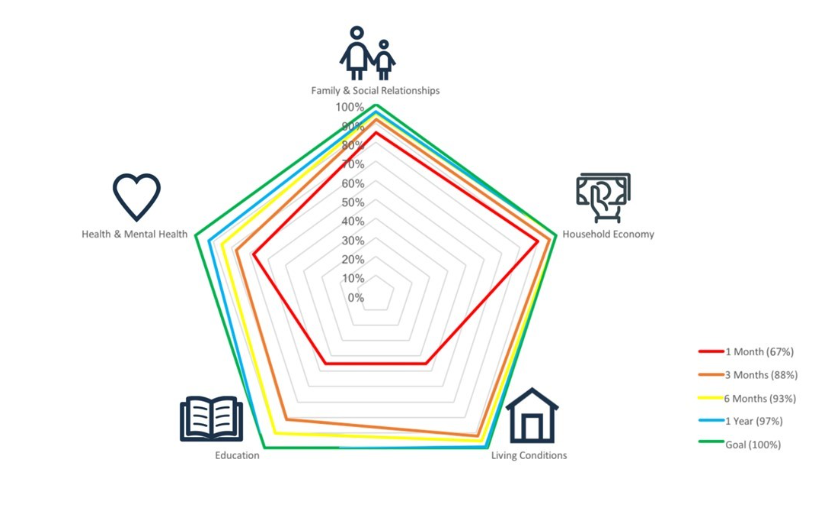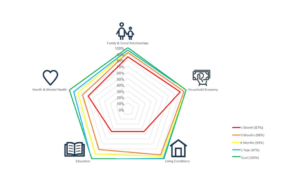272 children were sent back to their families in the wake of #Covid lockdowns
What happened to their education?
When the pandemic first struck in 2020, 64% of all children living in Child Care Institutions (CCIs) across India were sent back to their families, per a directive from the Supreme Court of India. 272 children from 11 Child Care Institutions (CCIs) supported by Miracle Foundation India were sent back home. As an emergency response, we came up with a two-pronged approach to expedite each child’s case management process:
- To ensure every child placed with family is safe, healthy, protected from risk, and thriving; and
- To design a permanency and follow-up plan for low-risk placements in coordination with the local government — to avoid re-admission of children back to the CCIs.
Background
Miracle India’s work has evolved to ensure that every child has an opportunity to grow up in a family, to become a healthy, happy, income-producing person and experience a true sense of belonging truly committed to its vision- “A Family for Every Child in Our Lifetime”.
The shift from institutional to family-based care was done in a systematic manner following the case management process leveraging Miracle Foundation’s Thrive Scale™ methodology in keeping with the principle of best interest of the child. Education related initiatives were planned in keeping with the needs and intervention requirements of the well-being domain of education among the five well-being domains of Miracle Foundation’s Thrive Scale™ methodology.
Key Words: Children’s Education, Covid-19 Pandemic, Miracle Foundation’s Thrive Scale™ methodology.
Figure 1
Miracle Foundation’s proprietary Thrive Scale™ methodology shown in figure 1 is at the heart of child centered case management, which seeks to develop individualized care plans and sound decisions regarding reintegration through active collaboration with the child and family at each step of the process. Children and families are assessed in five areas of well-being in which one of the critical well-being domains is education among the other significant domains of family & social relationships, household economy, living conditions, health & mental health.
As to their schooling, we undertook 8 measures to counter the education-related disruption children faced:
- Remote sessions were conducted by coaching center teachers, an initiative started by the CCIs. In this way, children got access to the school curriculum and education materials while the schools were shut. The CCI coaching teachers were guided on conducting virtual classes (through Zoom/Skype/Google Meet), preparing and sharing videos on WhatsApp, sharing lessons, and getting homework done.
- The Child Care Institution teams were equipped with a list of apps, including DIKSHA, E-Pathashala, EDU Mitra, Marathi GK, and Read Along: all easy-to-access study materials for children.
- Linkages were provided with Government scholarship schemes, free tuition schemes, and NGO-driven schemes.
- Tablets with internet connections were provided for the children and their siblings to attend online classes, exams, and other extracurricular activities. The children were oriented on using the tablets, operating video calls, and the like.
- Children were engaged in online creative works such as Mandala art and craft activities.
- The Mental Health resource person provided online counseling support for psychosocial assistance and managing stress.
- Children from Class X attended virtual career assessments and counseling programs.
- We also piloted a Life Skills Education program for 104 children aged 13+ years as a self-guided Google Classroom tool. Easy to understand, practical, and fun activities covering topics like stress management and expressing emotions were shared with children every Monday during this six-week pilot project.
Child Safeguarding
Care was taken to ensure that the tablets were installed with parental control apps, bedtime locks, and blocking unwanted apps to ensure online safety. Along with the CCI teams, we prepared guidelines for online safety to:
- Make children and parents aware of online safety;
- Propagate a child’s pledge to hold children accountable;
- Share a real-life story with do’s and don’ts of browsing the internet;
- Running parents through parental consent;
- Sharing what to do when a child’s safety is threatened online; and
- Sharing information on the National Cyber Crime Reporting portal.
References
The Lancet COVID-19 commission India task force: Reopening Schools after COVID-19 closures https://static1.squarespace.com/static/5ef3652ab722df11fcb2ba5d/t/60a3cff2b425ae21a5b49405/1621348340073/India+TF+Reopening+Schools+April+2021.pdf
Boston Consulting Group, January 2022, India Needs to Learn: A case for keeping schools open,


